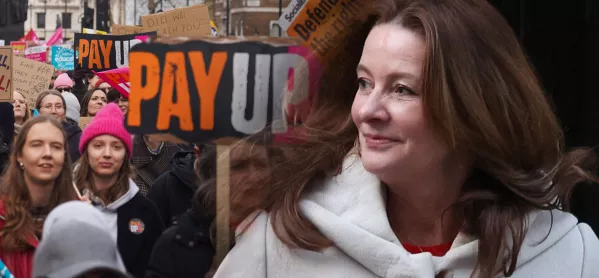DfE recommends 3% pay rise for experienced teachers

The Department for Education has recommended a pay rise of 3 per cent for experienced teachers in 2023-24 in its evidence to the School Teachers’ Review Body (STRB).
The government has said in a written submission to the pay review body that the rise, coupled with increasing teacher starting salaries from £28,000 to £30,000 (£34,502 in Inner London), will be “manageable” within schools’ budgets next year.
The combination of the two means that, across the board, teachers will receive a 3.5 per cent uplift on average, according to the evidence.
A union leader has responded to this recommendation to warn that it would be another “real-terms pay cut” for teachers and that any suggestion that it will tackle staff shortages facing schools is “not grounded in reality”.
- Live blog: The teacher strike - as it happened
- Analysis: How does teacher pay in England compare with that in other countries?
- More: What will happen next on strikes?
In its submission, the DfE states that different energy scenarios mean that “more headroom could be available than the 3.5 per cent currently estimated”, and any extra money could be used “for additional investment in areas which benefit pupils, including, for example, a higher pay award”.
It later adds: “The department holds no further funding for the core schools budget in reserve, including for teacher pay: the cost of each year’s teacher pay award, in mainstream schools, special schools and alternative provision, needs to be covered from the total funding available through the core schools budget.
“It is therefore for headteachers to carefully plan their budgets to manage the 2023 teacher pay award within core funding - with due regard to the considerations set out in this evidence as an aid to this planning”.
Pay proposal ‘not grounded in reality’
Responding to this recommendation, Geoff Barton, the general secretary of the Association of School and College Leaders said: ”The long-term decline in the real value of teacher pay has put educational standards at serious risk. The resultant recruitment and retention crisis means it is a constant challenge for school leaders simply to put a teacher at the front of the classroom.
“The suggestion that a 3 per cent pay award for the majority of teachers, which works out as yet another real-terms pay cut, is enough to solve the major staff shortages is not grounded in reality.”
He called on the STRB to recommend “significant improvements to pay that are required to protect the education service from further harm”.
Dr Patrick Roach, general secretary of the NASUWT teaching union, said that teachers “cannot be expected to endure another year in which the value of their pay continues to fall behind the cost of living”.
He said that “any below inflation pay award is a pay cut” and would be a “further insult to the professionalism and hard work of the teaching profession”, adding: “The STRB must reject any pressure from ministers to accept or simply to rubber-stamp the government’s position.”
In September last year, experienced teachers were given a 5 per cent pay rise.
This was more than the DfE had originally proposed in March (3 per cent) but fell far short of the “fully funded, inflation-plus pay increase” demanded by teaching unions.
Members of the NEU teaching unions have already taken part in one day of strike action over this offer, with more to come over the coming weeks, unless a breakthrough is made.
In a bid to avert the strikes, education secretary Gillian Keegan wrote to unions this afternoon, inviting them to ”build on the constructive discussions that have already taken place and move into formal talks on pay, conditions and reform”.
However, a DfE spokesperson said: “A condition of these talks will be that the National Education Union calls off next week’s strike action.”
The STRB, which sets teacher pay in England, will not necessarily follow the DfE’s proposal - though with the exception of last year, its pay awards do tend to follow government recommendations.
You need a Tes subscription to read this article
Subscribe now to read this article and get other subscriber-only content:
- Unlimited access to all Tes magazine content
- Exclusive subscriber-only stories
- Award-winning email newsletters
Already a subscriber? Log in
You need a subscription to read this article
Subscribe now to read this article and get other subscriber-only content, including:
- Unlimited access to all Tes magazine content
- Exclusive subscriber-only stories
- Award-winning email newsletters
topics in this article



